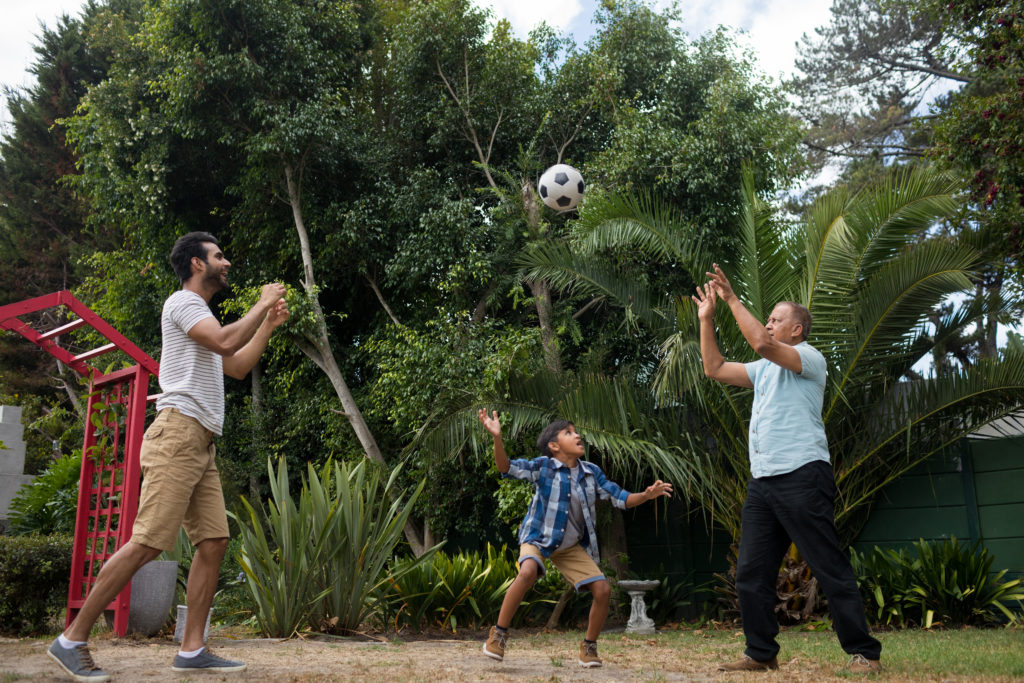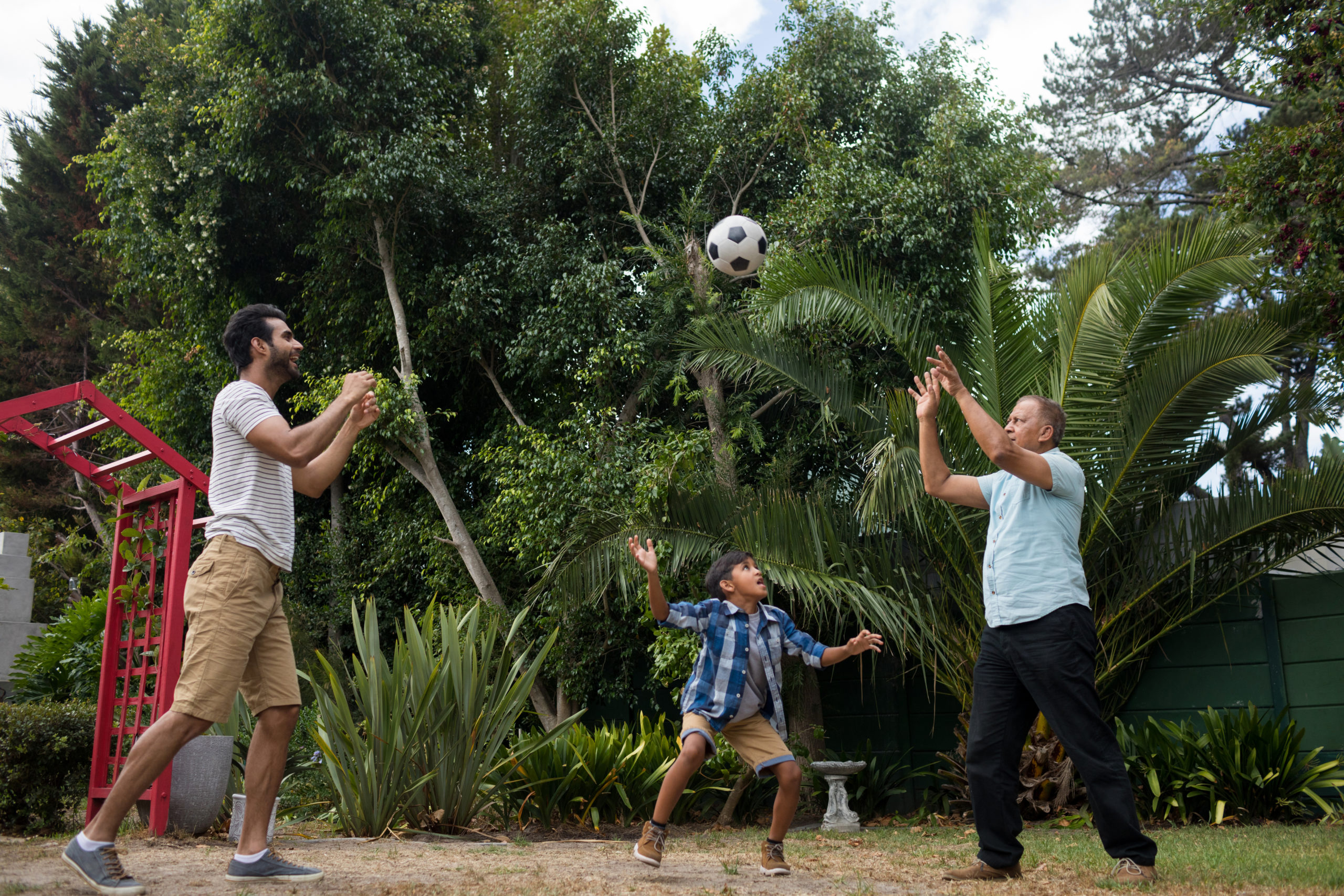If you find yourself in the unenviable position of simultaneously raising kids and caregiving for aging parents, you’re probably familiar with the phrase, “sandwich generation,” which is a rosier way of saying, “caught between a rock and a hard place.” However, it doesn’t have to be all downside. Along with managing your time, it’s also a matter of controlling your mindset. The important distinction to make is that the approach to caring for children is not the same as caring for elders. If you confuse the two, you’ll be adding unnecessary stress to your situation. Once you grasp the difference, you’ll be letting go of some tension that makes life in the sandwich generation harder than it has to be.

Child is Father to the Man
When William Wordsworth coined that phrase (Blood, Sweat & Tears debut album notwithstanding), he meant that he as a child would “father” or raise the man he would become. However, in the case of sandwich generations, you will find yourself in the real, non-metaphorical position of parenting your parents. It follows that how you approach this figurative “mind-field” can lead to some explosive moments, especially if you forget to take your parenting pants off when dealing with your elders.
Much of raising children is dictatorial e.g.: “Because I said so” etc. Now, imagine your children taking that tone with you, e.g.: “Mom, you will let me stay up late and party with my friends or you’re grounded!” You see, it doesn’t work—but that’s what it sounds like to your parents. Regardless of how good your intentions are, they’re going to bridle at being given commands, even if it’s for their own benefit (another thing they feel they still know better than you). Sounds much like the way teenagers react, doesn’t it? The difference is that teenagers are hard-wired for rebellion (it’s how they establish an identity separate from yours) and actually don’t know better, while your parents have a lifetime of experience—much of it guiding you through your formative years and teenage angst. The problem is that their wiring may be shorting out every now and again, which creates the illusion of childlike behavior. Your mission, since you’ve been chosen to accept it, is to differentiate between childcare and eldercare. While the net effect might appear the same, the underlying motivations are quite different.
A good example is driving privileges. Your teenager wants to use the family car for a date or just cruising; you imagine DUIs, police, and accidents. On the other hand, an 80-year-old behind the wheel doesn’t have to drink to experience impaired judgment in order for police and accidents to ensue. Your problem is that both child and parent may believe that their driving is impeccable, but from a legal standpoint, you’re responsible for your child but not your parent. Your parents are well within their rights to get in the car whenever they wish. Your dilemma is to convince them to turn over the keys willingly and give up independence in the process—hopefully before anything traumatic and irreversible makes the decision for them. (See our blog post: “Is It Time To Stop Driving?”)
Therein lies the fine line you must walk; teaching independence to your children while limiting it for your parents. Excessive limitations can be galling regardless of age, but for your parents, who’ve been autonomous for longer than you’ve been alive, it’s particularly humiliating and counterproductive. While limits are important in terms of defining our lives (life dissolves in the boundless), if you go too far in imposing limitations on others, they will rebel. As such it’s necessary to even set limits upon limitation.
If your parents do not have dementia, Alzheimer’s, or other mental impairments, they have the right to make decisions about their living arrangements and their care. You may not agree with their choices, but you must accept that they are free to make them. It follows that a dictatorial stance will meet resistance, as it does with children, but you can overrule your kids. Rather than dictate terms to your parents, you must make them a part of care decisions. Talking to them as though they are children will be met with resentment and resistance. In short, they are adults. Treat them as such.
No Time Left For You
How you divide your time between your child-rearing and caregiving chores is a very real problem. There are no mental gymnastics you can do that will squeeze any more than 60 minutes into an hour—but that won’t stop you from beating yourself up about what you “should” be doing. It’s pretty much a given that you’ll find yourself telling yourself scary stories about what can happen when you’re not at your parent’s house, or wondering what bits of deviltry your kids can get up to while you’re at your parent’s house administering care.
For example, what if your mother or father might fall during the night when you’re at home? Shouldn’t you be sleeping over there? But what about your own home? Are you neglecting your spouse and children, potentially raising a 21st century Lex Luthor or Cruella de Vil who will wreak havoc on an unsuspecting populace? Unless you’re Nurse Ratched, if anything, you will be teaching your children compassion and responsibility by example—so stop telling yourself scary stories until something actually happens that requires your presence. Easier said than done, so start practicing now.
On the plus side, to help you deal with real issues of time, there are monitoring systems available that can sense when an elder has fallen; is somewhere they shouldn’t be; or hasn’t retrieved their medicine. These systems can send notifications to up to 20 people to respond. (See our article on technological solutions for caregivers.) With such a system in place, you are as close to being in two places at once as physics will allow. That should garner you some peace of mind while you learn to control your thoughts,* which is far more necessary in caregiving than you might think (see what we did there?).
* Buddha described the mind as a drunken monkey that jumps from object to object uncontrollably. It screeches, chatters, carries on endlessly, and throws its poop in your brain (Yes, The Buddha often said, “poop”). There are ways to quiet the mind, including meditation and quietly reasoning with yourself. Controlling thoughts is not something you can do by clenching your teeth and forcing them out of your head. The more you fight a thought, the more it holds on and the more opportunities you give your mind to think of weapons to use against you. The secret is to let these thoughts go when they occur. Let them wash through your mind without judgment or resistance and flow out of your cosmic brain drain (like flushing a toilet full of jumping monkey poop). Think of your mind as a radio that constantly blasts bad news. You can’t get rid of it entirely, but you can ignore the programming and turn down the volume. Eventually, you’ll be able to change the channel and play something nice.
Another thing you can try is to set aside time to spend with your parents just for the sake of visiting—maybe even having . . . dare we say it . . . fun. Looking after your parents doesn’t have to be a chore, like taking out the garbage or cleaning a cat box. After all, consider the mental effect on your parents if they only see you annoyed or exhausted when you come to their home to dispense care (and resentment). If you set aside time to visit parents for something other than caregiving, you might even get your kids to come along with you. Fancy that, you can spend time with both and not have to feel guilty.
Nothing Is Easy
Each generation experiences difficulties, and as parents, there is a tendency to dismiss the problems of children. As adults who are consumed with keeping and maintaining a household, the perspective is that if you don’t have to worry about paying bills, your problems are insignificant, or at least to be taken lightly. However, according to the Pew Research Center, American teens from ages 13 to 17 face increasing anxiety and depression, bullying and cyber bullying, drug and alcohol use, gangs, poverty, school shootings, and teen pregnancy. It’s not easy being teen.
How we interact with each other in terms of these and other circumstances of life is often tumultuous—particularly if we are unwilling to appreciate and respect each generation’s point of view.

Also, be aware that as seniors, your parents are now experiencing life in a way that is new to them. Unfortunately, as you get older, life means that things are being taken away—sometimes at an alarming rate. The point is, you’re going to be juggling a great deal in terms of both mental and physical issues from multiple viewpoints. As such, your greatest mental assets will be patience and respect for what your parents and your children are going through. (And it doesn’t hurt to go easy on yourself either.)
All Things Must Pass
Regardless of what you face in life, nothing lasts forever, not even hardship. We all have heartaches and may face one crushing disappointment after another. That’s just life. What changes is not life so much as our reaction to it. It’s said that wisdom is merely exhaustion. Eventually, we learn to take things in stride. To paraphrase Marcus Aurelius, the last philosopher-emperor of Rome, to perform an act of kindness is to fulfill the purpose for which we were created and is its own reward. Sometimes it doesn’t feel like that, but think about how you felt after performing a random act of kindness. There’s a glowing feeling of satisfaction that can’t be had any other way. And, as a parent, you now have an inkling of what your parents went through over you. Perhaps instead of random, they deserve planned acts of kindness more than anyone else.
That said, it’s important to realize that attitude of mind alone does not solve your logistical problems. You face real practical issues that perception alone cannot solve. But you don’t have to tough it out alone. It’s no crime to ask for help, which exists in the form of technological aids and other people, such as New Wave Home Care.



